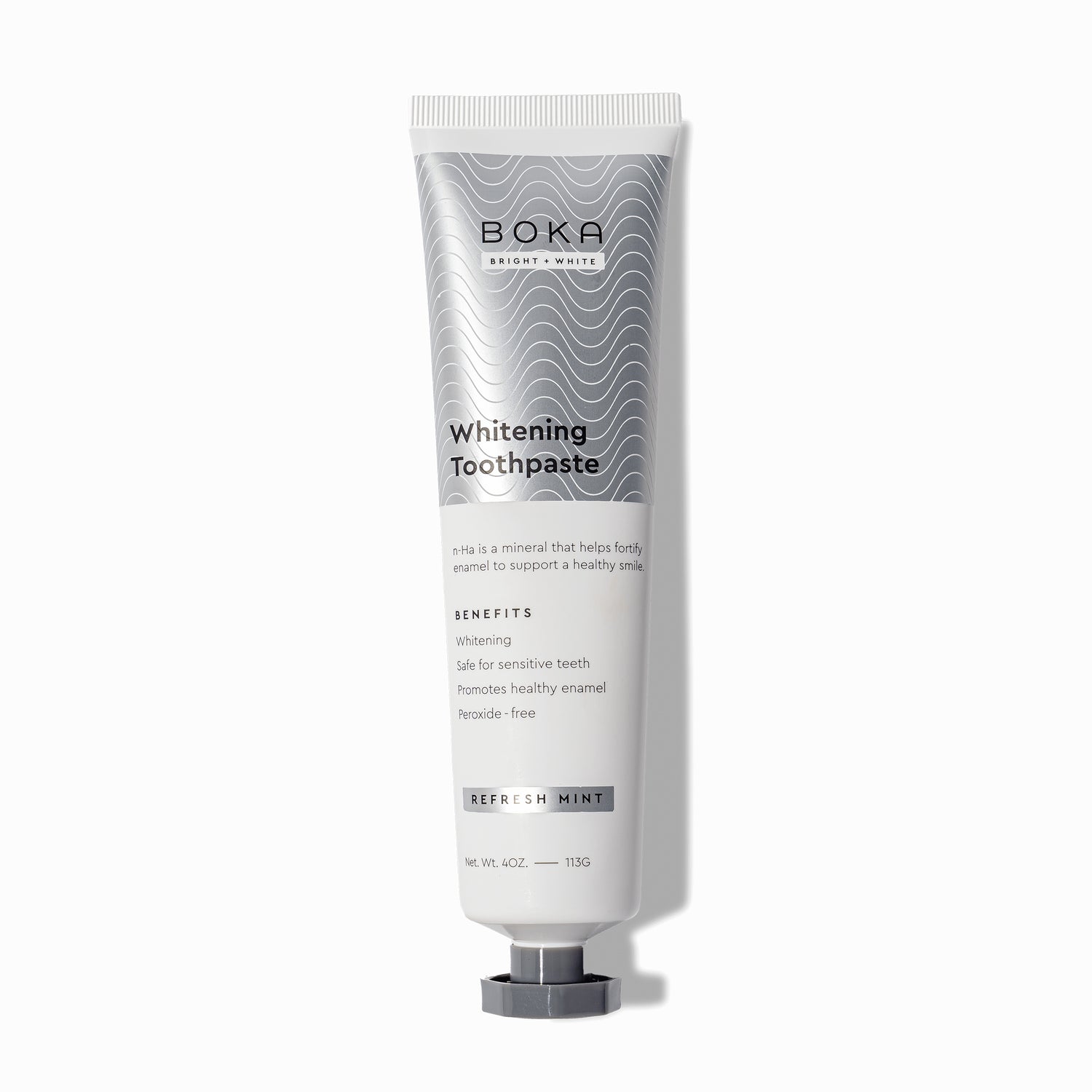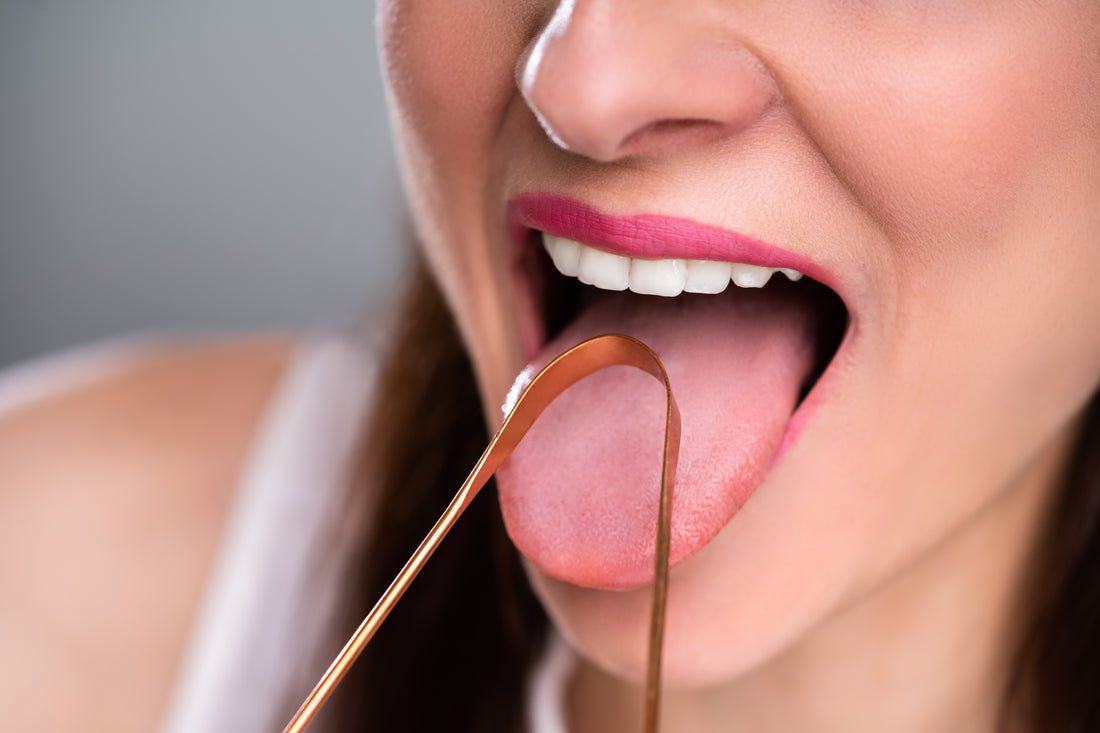Have you considered the benefits of tongue scraping?
If you're concerned about your oral hygiene, you might be missing out on a simple yet effective way to improve the quality of your health and prevent things like bad breath from clogging up your day!
Tongue-scraping involves using a tool to remove the buildup of nasty bacteria that can sometimes coat your tongue.
This unsavory yellow or white film contains a mixture of food debris, bacteria, and skin dead cells – which we're sure is not a team you want hanging out in your mouth!
In this article, we'll explore six surprising benefits of tongue-scraping and what these might mean for you.
We'll also tackle questions such as how often you should be scraping your tongue, and what the proper technique is for tongue-scraping.
Let's dive in!
How Does Tongue Scraping Benefit You?
If you’ve never thought about cleaning your tongue before, you should consider giving it a go!
You might find some surprising benefits, from improving your oral hygiene to even having good health implications for later in life.
Let’s examine some reasons why tongue scraping might be a good option for you:
1. It makes your tongue look (and feel) nicer
We know that feeling all too well!
You stare at yourself in the mirror, gazing in horror at the state of your tongue. A white or yellow film clings to the back of your tongue - is there something wrong with you?
Luckily, this can be perfectly normal. It’s caused by debris, bacteria, and dead skin cells getting trapped on the surface of your tongue. This is often caused by enlarged or inflamed papillae (your taste buds).
One benefit of tongue scraping regularly is that you can prevent this buildup from happening. Research suggests that scraping your tongue helps your tongue look and feel nicer (6).
Scraping regularly is the key to getting rid of the buildup of nasties and preventing it from happening again.
This helps improve the appearance of your tongue, so you won’t be worried about that alarming look in the mirror again!
2. It can eliminate bad breath
Another benefit of tongue scraping is that it can improve the way your mouth smells, including your breath!
Odorful bacteria love to hang out on your tongue, causing that unpleasant smell you might be familiar with.
You can try to use mouthwash or chewing gum to get rid of the smell, but these will only mask it. Removing the source is the most effective way to eliminate bad breath.
The research backs this up too. One study from 2004 found that using a tongue scraper is more efficient than a soft-bristle toothbrush at eliminating bad breath.
The results discovered that while using a toothbrush is good for cleaning your tongue, the scraper performed much better at getting rid of the sulfur compounds that cause bad breath.
A later review from 2010 also backed up this study. This review looked at five studies related to tongue scraping’s ability to reduce bad breath.
It found that all five studies supported the claim that tongue cleaning helps to reduce bad odor and coating on your tongue!
The most effective way to reduce bad odor is a healthy dose of tongue scraping alongside regular teeth brushing. Using both instead of just one is the key to having a clean, fresh-smelling mouth!
3. It improves your overall oral hygiene
Adding tongue scraping to your daily dental routine can improve the quality of your oral health. Tongue scraping helps eliminate nasty bacteria from your mouth, which can help prevent dental problems down the line.
There's also a myth that using a toothbrush to clean your tongue works just as well as a tongue scraper. However, a 2004 research study found that tongue scrapers removed 30% more volatile sulfur compounds from the tongue compared to a toothbrush with soft bristles.
A study from 2005 demonstrated that tongue scraping reduces the presence of Mutans streptococci and Lactobacilli bacteria in your mouth.
These bacteria are prone to causing bad breath and dental decay and like to lurk around your mouth!
The study involved participants scraping their tongues for two minutes at a time twice daily. After only one week, the results clearly showed the reduction of these harmful bacteria.
This goes to show that scraping your tongue improves the quality of your oral hygiene.
Adding it into your daily routine is a good step towards preventing cavities and other issues from rearing their ugly heads the next time you visit the dentist.
4. It enhances your immunity
As we’ve discussed before, tongue scraping helps remove bacteria from your mouth. But did you know that this also has the added benefit of improving your immunity?
A review published in 2021 examined the benefits of tongue scraping on elderly patients.
It found that tongue scraping helped to improve the respiratory functions of a lot of participants, improving their quality of life and limiting the potential for respiratory issues.
In particular, the review discussed tongue scraping’s ability to prevent aspiration pneumonia.
While the study was conducted on older participants, it does pay to start early!
Getting into the habit of tongue scraping now might prevent you from developing issues down the line, with the benefit of improving your immunity in the meantime.
5. It reduces the risk of gum disease
Did you know that tongue scraping can benefit your gums in particular? While also showing improvements to your oral health overall, tongue scraping is a key player in preventing gum disease.
A study from 2020 showed that tongue scraping can play an important role in reducing the risk of gum disease.
The study concluded that the best way to prevent gum disease is to scrape your tongue alongside normal brushing activities. This is because tongue scraping can stop harmful bacteria from growing in your mouth.
If you have a history of gum disease, tongue scraping is one of the best ways to help prevent it from happening again!
Regularly cleaning your tongue will help prevent the buildup of harmful bacteria and debris, keeping your gums healthy and fresh.
6. It can improve your taste buds
Ever wondered how you can taste things better? Look no further than tongue-scraping!
That’s right: our final surprising benefit of tongue scraping is that it can help improve your sense of taste.
This is all because tongue scrapers clean your papillae – the raised bits on your tongue which are your tastebuds.
A buildup of debris, bacteria, and dead skin cells can clog up this part of your mouth, leaving an unpleasant (literally) taste in your mouth. Therefore, the more you remove this buildup – the more you’ll taste!
Improving your taste buds means improving your quality of life. After all: the more you can taste, the more you’ll enjoy food!
It can also help change your diet, as you’re less likely to reach for food with high sugar and sodium content if you have an improved sense of taste.
There’s plenty of new and old research to back this up. One study from 2004 showed that participants had an improved sense of taste after two weeks of consistent tongue scraping. This goes to show that the results can come quickly!
More recently, a study from 2020 examined the relationship between age, taste buds, and tongue scraping.
The study found that people over the age of 45 had more of a noticeable difference in their taste buds after tongue scraping.
How often should you scrape your tongue?
When it comes to how often you should scrape your tongue, there’s no right answer. It all comes down to what kind of results you want to see.
For example, if you’re looking to eliminate the causes of bad breath, scraping after every meal can help show improvements!
This is because scraping in the morning won’t stop odors from developing later in the day, it just removes what’s already there.
However, some research suggests that the best time to scrape your tongue is when you brush your teeth.
Making it a part of your pre-existing routine helps it become a habit, and improves your overall oral health.
According to the Ayurveda, one of the most essential principles of Ayurveda is routine. The nervous system starts to loosen up when the body becomes used to the consistency of completing the same activities at around the same time every day. Meditation, exercise, bathing, and grooming techniques and tongue scraping, are all part of an Ayurvedic morning routine.
In particular, a morning routine gives us the chance to establish a positive tone for the day and give priority to the things that really matter.
Scraping twice a day is the best way to prevent a long-term buildup of harmful bacteria, as it helps prevent issues down the line like gum disease, dental decay, and bad breath.
Scraping twice a day is the best way to start. However, if this is too hard to remember, you can always start with once a day in the evenings and go from there. It’s all about working what feels right into your routine.
Don’t forget to consult your dentist if you have any issues related to tongue scraping, including bad breath that won’t go away!
This might be due to underlying issues that won’t be easily solved by tongue scraping.
How to properly scrape your tongue
Choose the right tongue scraper for you
Tongue scraping first starts by finding the tongue scraper that will suit your needs.
It can be tempting to reach for your toothbrush instead of purchasing a new tool. However, the research suggests that tongue scrapers are more effective at removing buildup on your tongue.
You’ll find a large variety of tongue scrapers in the market. They can come in all kinds of materials and sizes, from plastic to steel and other metals. What you choose comes down to your personal preference.
Of course, we would recommend opting for a steel scraper. While plastic scrapers are cheaper, they tend to wear down faster. On the other hand, metal scrapers last longer and are super easy to maintain.
We would recommend Boka’s Rosana Stainless Steel Tongue Scraper.
Our scraper is made from stainless steel, which is long-lasting while also being good for your mouth! Its curved design is effective at hitting every inch of your tongue and is easy to incorporate into your daily routine.
Follow the proper technique for tongue scraping
Scraping your tongue is as straightforward as it sounds. You simply pull the scraper along the surface of your tongue. Here’s a step-by-step guide:
- Stand in front of your mirror and open your mouth wide. Stick your tongue out so that you can easily see and reach the back.
- Starting at the back, pull the scraper towards the tip of your tongue.
- Be careful - don’t put too much pressure on your tongue! This can damage the surface of your tongue including your taste buds.
- Repeat this pulling motion until you’ve cleaned the entire surface of your tongue. It might be easier to focus on a certain side or angle of your tongue.
- Remember to rinse or wipe away debris from the scraper after each swipe.
- Finish up by giving your scraper a thorough rinse with warm water. Look in the mirror and show off that confident smile!
Common mistakes to avoid while tongue scraping
While tongue scraping might sound straightforward, it can be easy to mess up in practice!
One of the most common mistakes of tongue scraping is placing the scraper too far back.
This can activate your gag reflex, which isn’t pleasant – and not fun if you’re in the middle of brushing your teeth!
You can easily avoid this by starting in the middle of your tongue, rather than the back. When you repeat the scraping motions, place the scraper further and further back so that you can hit the far end of your tongue.
Another mistake is reaching for your toothbrush instead of a scraper!
Research shows that toothbrushes are also good for cleaning your tongue, but scrapers are more efficient.
Using a toothbrush also heightens your risk of activating your gag reflex, so it is to opt for a scraper if you’re looking for a more comfortable experience.
Finally, don’t use too much pressure on your tongue with the scraper.
One of the biggest risks of tongue scraping is damaging your tongue, which can disrupt your tastebuds and is also a generally unpleasant experience overall.
Additionally, using the scraper to unintentionally cut the surface of your tongue is a possibility.
To prevent this, make sure the edges of your tongue scraper are smooth and not uneven. Also, check it before each use to ensure it is still safe to use.
When scraping, start gently and play around with the firmness of your pulling.
Don’t push down too hard! You want to apply enough pressure that you can scrape away the nasties of your tongue, but also be gentle enough to not cause damage. It’s a difficult balance!


